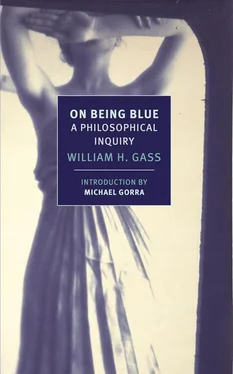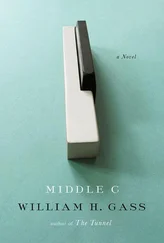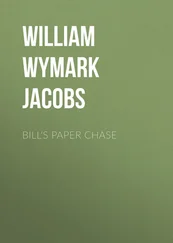Beckett is a very blue man, and this is a very blue passage. Several brilliant pages are devoted to the problem. The penultimate solution requires that fifteen stones be kept in one pocket at a time, and moved together — all the stones, that is, which are not being sucked. There is, however, an unwelcome side effect: that of having the body weighted down, on one side, with stones.
… I felt the weight of the stones dragging me now to one side, now to the other. So it was something more than a principle I abandoned, when I abandoned the equal distribution, it was a bodily need. But to suck the stones in the way I have described, not haphazard, but with method, was also I think a bodily need. Here then were two incompatible bodily needs, at loggerheads. Such things happen. But deep down I didn’t give a tinker’s curse about being off my balance, dragged to the right hand or the left, backwards and forwards. And deep down it was all the same to me whether I sucked a different stone each time or always the same stone, until the end of time. For they all tasted exactly the same.
De Sade in a harem of quints could not have faced the issue of love’s little nourishments more squarely, or that of the faceless fuck, or equal treatment (stones, wives, Jews, portions of anatomy, don’t forget, turn and turn about), and how could one better describe our need for some security in this damn disagreeable/dull dark difficult/disorderly life? And then the resolution, when it comes — is it not a triumph of both will and reason?
And the solution to which I rallied in the end was to throw away all the stones but one, which I kept now in one pocket, now in another, and which of course I soon lost, or threw away, or gave away, or swallowed.
As we shall see, and be ashamed because we aren’t ashamed to say it, like that unpocketed peppermint which has, from fingering, become unwrapped, we always plate our sexual subjects first. It is the original reason why we read… the only reason why we write.
It is therefore appropriate that blow and blue should be — at our earliest convenience — utterly confused.
So I shall, keeping one in each of my four pockets while one is in my mouth, describe five common methods by which sex gains an entrance into literature… as through French doors and jimmied windows thieves break in upon our dreams to rape our women, steal our power tools, and vandalize our dreams. The commonest, of course, is the most brazen: the direct depiction of sexual material — thoughts, acts, wishes; the second involves the use of sexual words of various sorts, and I shall pour one of each vile kind into the appropriate porches of your ears, for pronouncing and praising print to the ear is what the decently encouraged eye does happily. The third can be considered, in a sense, the very heart of indirection, and thus the essence of the artist’s art — displacement: the passage of the mind with all its blue elastic ditty bags and airline luggage from steamy sexual scenes and sweaty bodies to bedrooms with their bedsteads, nightstands, water-glasses, manuals of instruction, thence to sheets and pillowcases, hence to dents in these, and creases, stains and other cries of passion which have left their prints, and finally to the painted chalk-white oriental face of amorously handled air and mountains; lewdly entered lakes. The fourth I shall simply refer to now as the skyblue eye (somewhere, it seems to me, there should be a brief pinch of suspense), and the fifth, well, it’s really what I’m running into all my inks about, so I had better mention it: the use of language like a lover… not the language of love, but the love of language, not matter, but meaning, not what the tongue touches, but what it forms, not lips and nipples, but nouns and verbs.
• • •
So blue, the word and the condition, the color and the act, contrive to contain one another, as if the bottle of the genii were its belly, the lamp’s breath the smoke of the wraith. There is that lead-like look. There is the lead itself, and all those bluey hunters, thieves, those pigeon flyers who relieve roofs of the metal, and steal the pipes too. There’s the blue pill that is the bullet’s end, the nose, the plum, the blue whistler, and there are all the bluish hues of death.
Is it the sight of death, the thought of dying? What sinks us to a deeper melancholy: sexual incompleteness or its spastic conclusion? What seems to line our life with satin? what brings the rouge to both our cheeks? Loneliness, emptiness, worthlessness, grief… each is an absence in us. We have no pain, but we have lost all pleasure, and the lip that meets our lip is always one half of our own. Our state is exactly the name of precisely nothing, and our memories, with polite long faces, come to view us and to say to one another that we never looked better; that we seem at last at peace; that our passing was — well — sad — still — doubtless for the best (all this in a whisper lest the dead should hear). Disappointment, constant loss, despair… a taste, a soft quality in the air, a color, a flutter: permanent in their passage. We were not up to it. We missed it. We could not retain it. It will never be back. Joy-breaking gloom continues to hammer. So it’s true: Being without Being is blue.
Just as blue pigment spread on canvas may help a painter accurately represent nature or give to his work the aforesaid melancholy cast, enhance a pivotal pink patch, or signify the qualities of heavenly love, so our blue colors come in several shades and explanations. Both Christ and the Virgin wear mantles of blue because as the clouds depart the Truth appears. Many things are labeled blue, thought blue, made blue, merely because there’s a spot of the color here and there somewhere on them like the bluecap salmon with its dotted head; or things are called blue carelessly because they are violet or purple or gray or even vaguely red, and that’s close enough for the harassed eye, the way the brownish halo which surrounds the flame of a miner’s safety lamp to warn of firedamp is said to be a bluecap too. Or they are misnamed for deeper reasons: in the ninth century, when the Scandinavians raided Africa and Spain, they carried off samples of the blue men who lived there all the way to Ireland, hence nigger-blue is applied to an especially resinous darkness sometimes by those who are no longer Vikings. And Partridge reports the expression: the sky as blue as a razor . Find an eye as blue as indecency itself, an indecency as blue as the smoke of battle, or a battle as blue as the loss of blood. We might remain with such wonders: as blue as… as blue as… for good and forever.
Anyway, sixth (since the first week had as many working days), I shall describe and distinguish three functions for blue words, modes of production, a Marxist might describe them, and I shall argue that they are equally fundamental. Finally, I shall try to list the major motives, from reader’s, work’s, and writer’s point of view, for introducing blue material in the first place. As blue-law, blue-blazer, and bluebush. By my private count, you may not be surprised to learn, that makes sixteen separate thoughts I hope to wind my Quink-stained mouth around — turn, of course, and turn about.
LET US begin with a brief account of what happened when pirates overtook the whoreship Cyprian .
… the scene on deck was too arresting for divided attention: the pirates dragged out their victims in ones and twos, a-swoon or awake, at pistol-point or by main strength. He saw girls assaulted on the decks, on the stairways, at the railings, everywhere, in every conceivable manner. None was spared, and the prettier prizes were clawed at by two and three at a time. Boabdil appeared with one over each shoulder, kicking and scratching him in vain: as he presented one to Captain Pound on the quarter-deck, the other wriggled free and tried to escape her monstrous fate by scrambling up the mizzen ratlines. The Moor allowed her a fair head start and then climbed slowly in pursuit, calling to her in voluptuous Arabic at every step. Fifty feet up, where any pitch of the hull is materially amplified by the height, the girl’s nerve failed: she thrust bare arms and legs through the squares of the rigging and hung for dear life while Boabdil, once he had come up from behind, ravished her unmercifully. Down on the shallop the sailmaker clapped his hands and chortled; Ebenezer, heartsick, turned away.
Читать дальше












